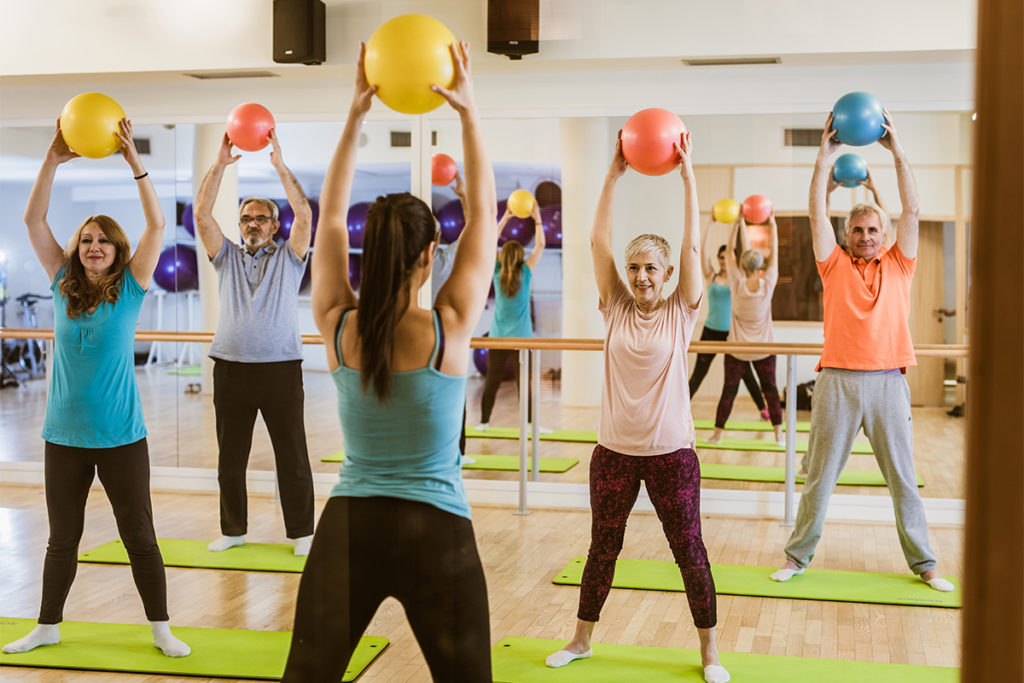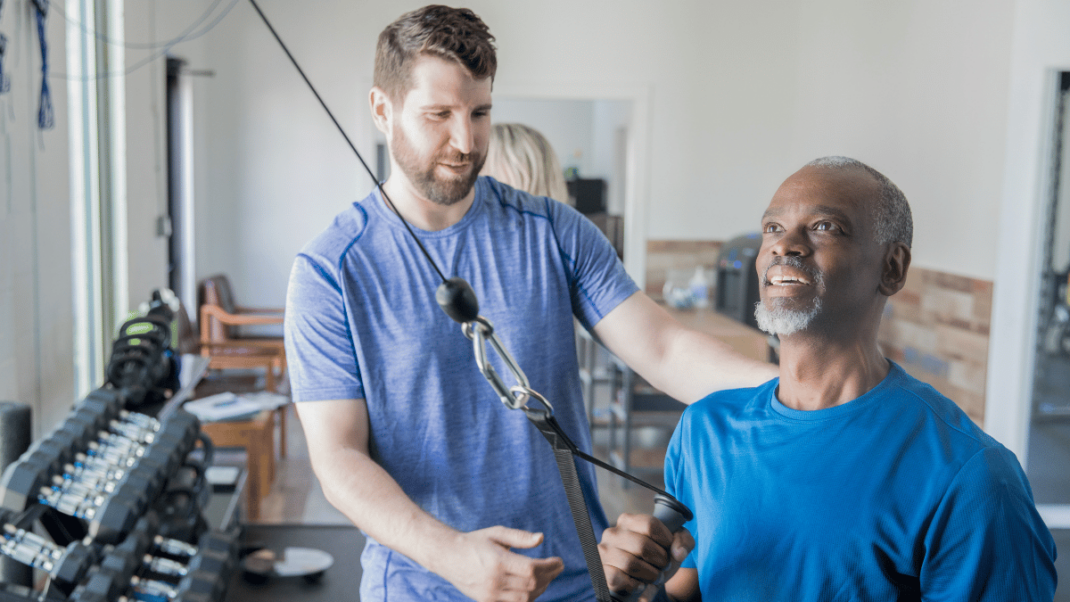Developing Better Concentration
Discover how to concentrate like a champion.
Quick. Visualize a group of Olympic runners just before the starting gun. Do they look distracted? Inattentive? Confused? No. Each is the picture of powerful, intense concentration. If only you could master that kind of focus, especially on days when even a ringing cell phone two rooms away or a buzzing fly distracts you.
It turns out that you can become a world-class concentrator. The ability to focus 100% on your immediate task isn’t unique to top athletes. Every fitness professional can learn and practice techniques that improve concentration abilities and help maximize everyday performance. Here’s how.
Making Order Out of Chaos—or Not
The mind’s normal condition is disorder, with random thoughts, perceptions and sensations all competing for attention, according to Sabine Kastner, MD, PhD, of Princeton University’s Center for the Study of Brain, Mind and Behavior. Adults usually manage to turn this chaos into reasonable order by exerting “attentional control” (as it’s known scientifically) to filter out some things and focus on others—in other words, by concentrating.
Why is this process more difficult on certain days? According to memory and concentration experts, your ability to focus drops when one or more of the following apply:
You’re Tired. Fatigue is concentration’s number-one enemy. A San Francisco Brain Research Institute study indicates that staying up just 1 hour later than normal significantly decreases focusing capability, even when you’re exerting an effort. Rack up sleep deficits regularly, and you’ll likely experience routine concentration problems.
You’re Stressed. Difficult clients, upcoming certification exams, rush-hour traffic, “Where’s that CD?!”—every fitness professional knows from unpleasant experience: The greater your stress levels are, the harder it is to concentrate.
You’re Physically Subpar. Physical distractions cause mental distraction. Expect more difficulty focusing whenever you’re under the weather—or even hungry. Certain medical conditions—including thyroid disease, anemia, depression, diabetes, adult attention deficit disorder and some medications—can also impact concentration. Anyone who experiences long-term attention difficulties should consult a physician.
You’re Bored. Still teaching the same old routine for the 45th time? No wonder your mind is wandering to the unfinished paperwork lurking on your desk. Concentration takes effort and willpower; it’s harder to marshal the necessary energy when you’re not really engaged.
You’re Trying to Do Too Many Things at Once. Multitasking—juggling multiple activities simultaneously instead of sequentially—makes it harder for the brain to focus, according to Harvard Medical School professors Edward Hallowell, MD, and John J. Ratey, MD, co-authors of Delivered From Distraction: Getting the Most out of Life With Attention Deficit Disorder (Ballantine Books 2005). Even worse, they say, frequent multitaskers may unintentionally be teaching themselves to have shorter attention spans, a condition called “pseudo attention deficit disorder.”
You’re Deluged With Any Combination of the Above. As distractions multiply, concentration ability plummets.
How can you learn to refocus, especially on your most disastrous days? Experts suggest a multipronged approach that will minimize both internal and external distractions and improve concentration skills.
Taking Care of Yourself
Food, rest and regular exercise can greatly improve conventration.
Fuel Your Brain. According to the American Dietetic Association, skipping breakfast and/or regular meals hurts concentration and mental performance. Jump-starting each day with a nutritious breakfast and then refueling every 3–4 hours is an outstanding way to improve concentration. Research from Western Human Nutrition Research Center at the University of California, Davis, suggests that diets low in iron, magnesium and zinc can impair concentration ability, so ensure that your diet is healthy and balanced. What about supplements like gingko biloba, ginseng or “concentration-enhancing” vitamins? Answer: Promising potential to improve concentration, but no definitive research yet.
Get Enough Sleep. Improving concentration requires mental effort, and a tired body can’t rise to the occasion. Ensuring adequate sleep can be the single most important step for improving your focusing ability. How much? The National Sleep Foundation recommends 7–9 hours, or enough to leave you feeling refreshed.
Keep Up Workouts. The good news for fitness professionals: Research proves that regular exercise will improve concentration, mental alertness and memory, so maintain your fitness routine while incorporating and practicing other recommended concentration techniques.
Practicing Concentration Techniques
These mental strategies can also improve concentration levels:
Minimize External Distractions. When you can, limit interruptions by turning off your cell phone, shutting the door or posting “Don’t Disturb” signs. Also, be aware of possible subtle disrupters, including background noises and smells. In a University College London attention study, people performed better in silence than when background music was played. Real-life translation: Turn off the radio when you really must study or pay close attention to traffic conditions. Also, be aware that smells—pleasant as well as nasty—can make it harder to apply your concentration skills.
Maximize Your Peaks. Most people are at their best in the morning, but “night owls” may function better later, says Cynthia R. Green, PhD, author of Total Memory Workout: 8 Easy Steps to Maximum Memory Fitness (Bantam 2001). Improve concentration by scheduling projects that require full focus and mental ability during personal peak periods. Plan more routine tasks for your lower-wattage times.
Incorporate Time-Management Strategies. Green advises keeping a pen and pad handy for quickly jotting down ideas that require later action. Also, she says, stop procrastinating. These classic time-management techniques “relieve” your mind from juggling mental to-do lists, allowing you to better focus on the here and now.
Prepare, Prepare, Prepare. Ease your mind by planning ahead so you don’t face distracting last-minute scrambles. And, say experts, don’t “wing it.” Whether you are going to give a speech or introduce new workout techniques to your 6:00 am client, advance planning will reduce the likelihood of focus-breaking anxiety.
Intend to Concentrate. Ever lose your car in a parking lot? That’s because you probably weren’t focusing to begin with, says Green. Humans tend to do what they tell themselves to do, so actively tell yourself to concentrate. When parking your car, this will help you pay attention to landmarks that will enable you to remember the parking spot. The more you practice concentrating, the more routine it becomes.
Use a Mantra. When your mind takes detours, close your eyes, inhale slowly and deeply and tell yourself, “Be here now.” Repeat twice. This simple practice, borrowed from Zen Buddhism, can help you return to the moment.
Scheduling Worry Time
One final strategy to improve concentration: Plan a worry time. “Worry time” sounds funny, but research shows that people who schedule one find themselves worrying up to 35% less within 4 weeks. Less worry = fewer intrusive distractions = improved concentration ability. Here’s how:
1. Designate a specific day or time—say, 4:30–5:00 pm daily—as your personal time to worry or think about things.
2. When you become aware of a distracting thought—maybe an upcoming performance review—remind yourself you’ll think about it later at your scheduled time.
3. Let the thought go, and refocus on your task.
4. From 4:30 to 5:00 pm, keep your appointment with yourself to think about your problems. With practice, this technique soon becomes automatic, reducing distractions the rest of the day.
Sports psychologists know that peak athletic performance depends on the ability to focus. Here’s how to adapt some of their strategies:
Learn to Identify and Stop Mental Distractions. When doing a task—say, working with a client—actively notice when your mind begins to wander (“When is my next appointment?” “What’s for dinner tonight?”). Say, “STOP!” to yourself, and immediately refocus.
Use a Physical Cue. Develop a quick physical motion that you connect with the act of focusing. For example, snap your fingers or briefly cup your hands around your eyes like a camera lens as you actively focus. Doing this same action every time you want to concentrate teaches your brain to switch to “focus” mode whenever you give that physical cue.
Practice 1-Minute “Selective Refocusing.” Several times daily, focus on a specific sound for several seconds—say, a voice. Then deliberately switch to another sound, like a bird. Then switch again, perhaps to traffic sounds. Continue rapid switching for 1 minute, actively focusing on individual sounds as you practice blocking out others. You can do this exercise visually, too, focusing on one person or object, then rapidly refocusing on another.
Keep Your Eye on the Ball. Literally. One of the simplest ways to improve concentration is to allot 3 minutes a day to sit 5 feet away from a ball, trying to focus your attention on it, to concentrate, to describe all the ball’s characteristics, to see nothing but that ball. Whenever your mind wanders—and it will!—say, “STOP!”
and refocus.
Take a Concentration-Oriented Class. Yoga, mindfulness meditation and other mind-body classes are among the disciplines where concentration is a built-in part of performance. Apply the techniques you learn to other situations to improve concentration.





